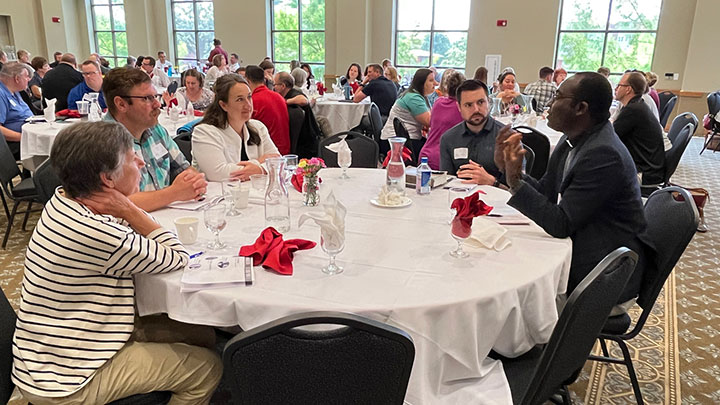
Father Francis Mensah, right, participates in a discussion with parish leaders during the Diocese of Davenport’s Synodal Summit at St. Ambrose University in Davenport last year.
By Dan Ebener and Marti Jewell
The Catholic Messenger
(Editor’s note: This is the first in a series of articles about parish vibrancy.)
During the COVID lockdowns, it was common for parishes to suspend all meetings of their parish pastoral councils and many of them did not start up again when the lockdown ended.
This finding was unexpected in the research project we conducted over the last two years for Catholic Leadership Institute and the Conference for Pastoral Planning and Council Development. We looked at parish vibrancy in 40 parishes across the USA, with a special focus on parishes with large numbers of Hispanic, Vietnamese and Black Catholics.
 Parish pastoral councils are the vehicle for pastoral planning in a parish, while finance councils attend to the business side of the parish. During these apostolic times, when we hear that the Church needs to focus more on mission and less on maintenance, it seems curious that so many parish pastoral councils were discontinued, especially when we consider that most finance councils found a way to meet.
Parish pastoral councils are the vehicle for pastoral planning in a parish, while finance councils attend to the business side of the parish. During these apostolic times, when we hear that the Church needs to focus more on mission and less on maintenance, it seems curious that so many parish pastoral councils were discontinued, especially when we consider that most finance councils found a way to meet.
Of course, many church leaders are calling for parishes to switch our focus “from maintenance to mission.” We are hearing this language from many church leaders, as participation in parish activities — from Mass attendance, to sacramental participation, to youth activities and adult faith formation — is on the decline. Part of the challenge in switching our focus to mission is getting more lay people to step up and serve on parish pastoral councils.
Parish pastoral councils provide the opportunity for lay people to be involved in breathing new life into the pastoral plans and activities of the parish. In the Diocese of Davenport, we have “particular law,” which means Church law that is particular to our diocese, which requires every parish to have an active parish pastoral council (Article #25).
Finance councils play a critical role in the mission of a parish as well. It is important that every parish run like a business in terms of finance, operations, accounting, human resources and the physical plant. Finance councils make sure the parish has the support and resources it needs for mission. By performing critical administrative tasks, finance councils can take some of the managerial pressure off our clergy, who are becoming older and fewer by the year.
Based on feedback from participants in our study, one reason why parish pastoral councils were suspended during (and after) COVID is that, as one of our participants put it, “the meetings were boring.” Too many parish meetings are seen as a waste of time, partly because we do not know how to plan pastorally, which includes knowing how to run a meeting.
Over the coming weeks and months, we will report on some of the things we learned from our study on parish vibrancy. We hope that our findings will be useful to our clergy and laity, particularly those who serve on parish pastoral and finance councils. If you and your parish are interested in learning more about the roles and responsibilities of the various parish boards, commissions and councils, and some of their best practices, please contact Dan Ebener at Ebener@davenportdiocese.org
For more information about parish pastoral councils, finance councils, lay trustees and boards of education in a parish, go to https://davenportdiocese.org/parish-manual
(Dan R. Ebener is a leadership professor for the Master of Organizational Leadership (MOL) program at St. Ambrose University in Davenport and director of Parish Planning for the Diocese of Davenport. Marti R. Jewell, associate professor emerita, is a professor, author and researcher of pastoral leadership.)











